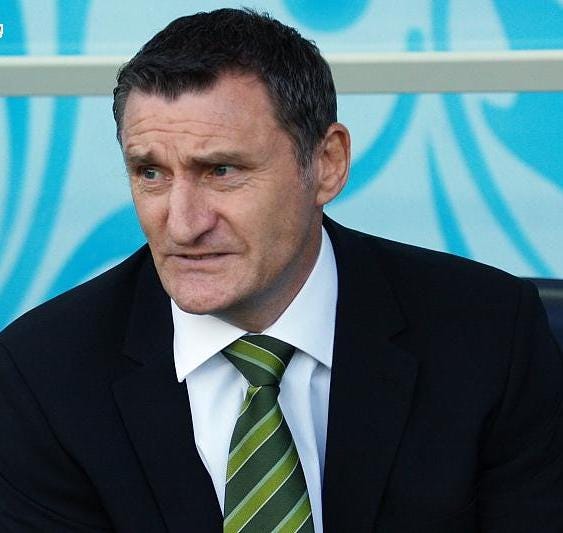Kings, Queens and commoners in Sunderland's highs and lows
The controversial firing of a popular, successful football manager
Feb 2024 update: after a miserable nine weeks and 12 matches in charge, six of them lost, Michael Beale was sacked. He can at least boast that he lasted longer than Liz Truss as PM …
Queen Victoria was on the English throne, albeit near the end of a reign of almost 64 years, when the football club I support won three of its six top-flight league titles.
The last such success in what we now know as the Premier League was in 1936, seven months before the abdication of King Edward VIII.
Sunderland did win the FA Cup in 1937, the trophy presented by King George VI and Queen Elizabeth (later the Queen Mother), and claimed the trophy again in sensational style, beating then-mighty Leeds Utd in 1973. Otherwise, notwithstanding some memorable promotions and gallant relegation battles, there has been nothing to emulate those heady heights.
Christmas present from my daughter Nathalie
We are a passionate lot, Sunderland supporters, but necessarily realistic. Any glory-seekers among us lead lives of perpetual disappointment.
We relish occasional bursts of top flight promise (successive seventh top finishes under Peter Reid in 2000 and 2001; 3rd top for anyone old enough to remember 1950). For 68 years from the club’s foundation until its first relegation in 1958, Sunderland played only in the old first division. And remarkably, the absence of sustained success since the Second World War has had little or no impact on that passion.
Every so often, however, the club does something to test our patience and understanding. On December 4, with Sunderland just three places off a playoff position in the Championship, Tony Mowbray was sacked as manager.
Image of Tony Mowbray: by Новикова Юлия
Mowbray was a popular figure among fans and, by all accounts, the young, often exciting players he nurtured.
Kristjaan Speakman, who holds that irritating modern title of sporting director, offered a convoluted and frankly illogical justification that seemed to boil down to “yes, Tony was doing OK but we got rid of him in case that changed”. After some tantalising signs that the club already had cunningly lined up a dynamic young coach from overseas, a fortnight passed before the spectacularly underwhelming announcement came: Michael Beale, known for mixed runs as manager of QPR and Rangers, was named as the new boss. He promptly presided over an embarrassing 3-0 home defeat to Coventry in his first game in charge.
I should make an admission. I have a reasonable track record of active support, despite having lived far from the North East of England for most of my adult life. I have sat or stood in 65 or so stadiums to cheer on my club. But long periods these days occur between each attendance and I watch games on TV or listen to them via the excellent BBC Radio Newcastle commentary team of Nick Barnes and Gary Bennett. Needless to say, I bow to the greater knowledge of others.
Mowbray was hardly perfect - his team also suffered a grim home defeat, 4-0 to local rivals Middlesbrough in October. But he performed wonders last season, getting a team into the playoffs whereas some had feared he would struggle after taking over a club newly promoted from the third tier. He also had an avuncular, reassuring way that endeared him to so many of us.
Certainly, I am with those Sunderland supporters who will take an awful lot of convincing that Beale represents any kind of progress or improvement.
There is another factor, which makes Beale’s job as hard as Mowbray’s was.
When I started watching the Sunderland of Jimmy Montgomery, Charlie Hurley and Brian Clough, football teams comprised goalkeeper, two full backs, three half backs and five forwards. Goals would come from elsewhere but the man expected to score most often “led the line” as the centre forward of those five attackers.
Styles gradually changed. We saw lots of 4-4-2 formations, then 4-4-1-1. Note, however, that there was always at least one striker. In the last two seasons, Sunderland have tried something quite revolutionary: no recognised striker at all.
We did have a very good one, the Scot Ross Stewart, so prolific that supporters nicknamed him the Loch Ness Drogba, who scored freely until injured at the end of January 2022 and missing the rest of last season. Luckily, Mowbray had those thrilling attackers coming in from the wings and goals still flowed, with Jack Clarke, Patrick Roberts and - on loan from Man Utd - Amad Diallo excelling game after game.
Without Amad, recalled to Old Trafford where he still cannot get a game, Clarke and Roberts have continued to provide threats and promise but the lack of a natural central goalscorer has cost Sunderland numerous points. With just days left of 2023, four young players recruited as strikers with some potential have somehow failed to score a single goal between them.
Speakman’s attempts to explain the glaring issue of playing without a striker are hardly more convincing than his rationale for firing a manager he admitted had done his job well. Nor has he been particularly successful in answering the strong suspicion that Mowbray was discouraged from using, or even retaining, the gifted playmaker Alex Pritchard because, at 30, he inconveniently seemed superfluous to a youth-obsessed strategy.
I may not live to see King Charles or any other member of royalty present another major trophy to a Sunderland captain (though we did have our own King Charlie, Charlie Hurley who has died since this article was published).
I do look forward to Michael Beale proving me and thousands of others wrong, and Speakman (and the French club owner Kyril Louis-Dreyfus) right. On Boxing Day, I am delighted to report, Beale enjoyed a better afternoon, making up a little for last Saturday’s debacle with victory away at Hull City.
But the wins had better keep coming.
If the dismissal of a well-liked manager, a salt-of-the-earth product of the North East, in favour of a more brash Londoner, fails to bring results to match Mowbray’s achievements, the next ruthless decision to be taken should arguably be to make Speakman himself pay the price of what he calls the club’s “obsession with progress”.
Colin Randall, December 2023




